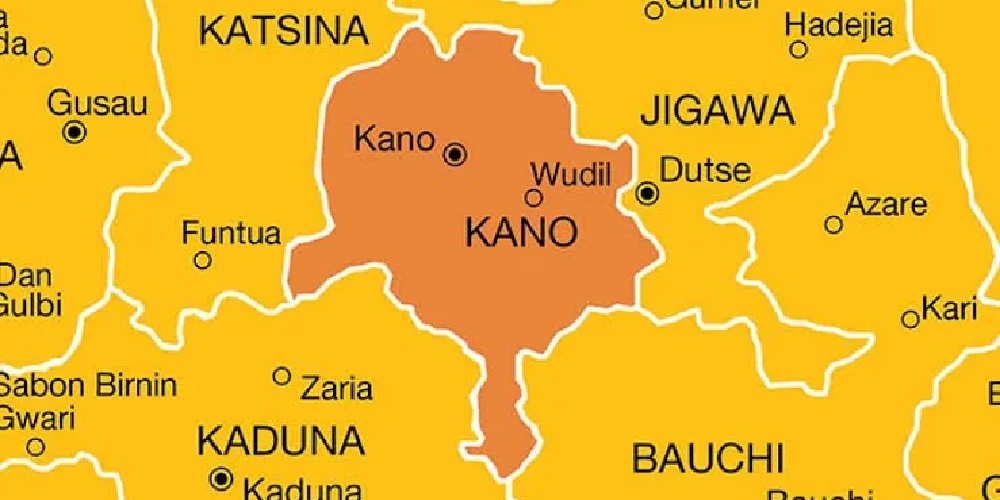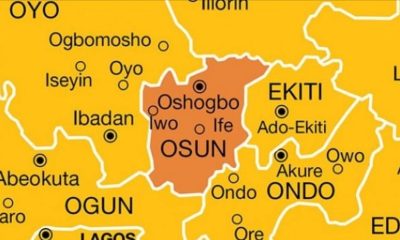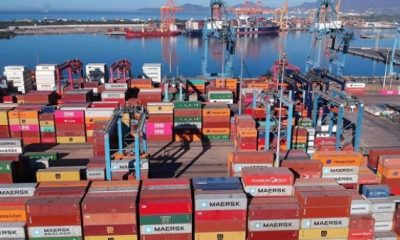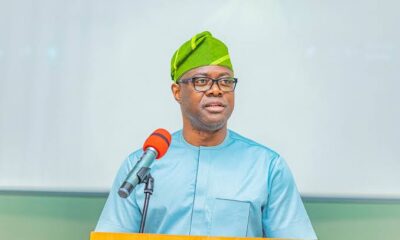Economy
‘Blame Buhari for hardship in Nigeria’ – Ex-Emir of Kano Sanusi

The former Emir of Kano, Muhammadu Sanusi, has blamed the current hardship in Nigeria on former President Muhammadu Buhari.
Sanusi said it would be unfair to blame President Bola Tinubu for the hardship Nigerians are experiencing.
Speaking on Sunday during a virtual religious event, the former Governor of the Central Bank of Nigeria, CBN, said Buhari’s administration failed to heed his counsel on how to salvage the country from economic woes.
The former Emir also vowed to criticise Tinubu if he sees any wrong economic policy in the future.
According to Sanusi: “If I am to be fair and just to President Bola Tinubu, he is not to blame for the current hardship; for eight years, we were living a fake lifestyle with huge debt from foreign and domestic debts.
“I can’t join other Nigerians criticising Tinubu on the current economic hardship, and I am not saying he is a saint free from wrongdoing, but in this current economic situation, President Tinubu is not to be blamed.”
He insisted that there was no other alternative than to remove the subsidy on fuel.
Economy
World Bank approves fresh $500m loan for Nigeria

The World Bank has approved a $500 million loan to Nigeria to support the country’s Community Action for Resilience and Economic Stimulus Program.
The loan was granted on March 28, 2025, according to report, marking a significant step in addressing Nigeria’s economic challenges through expanded access to livelihood support, food security services, and grants for poor and vulnerable households and businesses.
The project officially titled the NIGERIA: Community Action (for) Resilience and Economic Stimulus Program, aims to provide essential support to households affected by economic downturns and to bolster community resilience.
It will target vulnerable populations, offering grants to both households and small businesses to mitigate the impact of economic hardships.
The loan approval is expected to significantly enhance Nigeria’s efforts to stimulate the economy through grassroots support, particularly amid ongoing challenges such as inflation and high living costs.
The stimulus package will focus on improving food security and economic opportunities for communities hit hardest by recent economic fluctuations.
Daily Trust reports that in addition to the fresh loan, the World Bank is expected to give approval to other facilities later this week, the development which would significantly increase the country’s debt profile.
Economy
SEE Dollar to Naira Exchange Rate Today, Friday, March 28, 2025

The exchange rate between the U.S. Dollar (USD) and the Nigerian Naira (NGN) remains a crucial topic for businesses, travelers, and investors.
As of today, Friday, March 28, 2025, the exchange rates in both the official and parallel markets have experienced fluctuations, reflecting ongoing economic trends.
Official Dollar to Naira Exchange Rate The Central Bank of Nigeria (CBN) sets the official exchange rate, which is significantly lower than the parallel market rate. According to the latest data: Dollar to Naira exchange rate for today, Friday, March 28, 2025, is approximately ₦1,519 to ₦1,542 in the official market.
Source Exchange Rate (₦ per $1) Date CBN ₦1,532.39 March 25, 2025 Yahoo Finance (Opening) ₦1,531.50 March 27, 2025 Yahoo Finance (Closing) ₦1,533.52 March 27, 2025 The official exchange rate is the rate at which commercial banks and financial institutions trade forex under CBN regulations.
However, due to forex scarcity, many individuals and businesses turn to the black market.
Black Market Dollar to Naira Exchange Rate The parallel market (black market) offers a different exchange rate, often higher than the official rate.
Reports from the Lagos parallel market on March 27, 2025, indicate: In the black market, the Dollar to Naira exchange rate as of today, March 28, 2025, is approximately ₦1,560 for buying and ₦1,570 for selling. –
Transaction Type Exchange Rate (₦ per $1) Buying Rate ₦1,555 Selling Rate ₦1,560 Other reports suggest an average black market rate of ₦1,540 per USD, reflecting the fluctuations observed throughout the week.
Recent Dollar to Naira Fluctuations Over the past week, the exchange rate has varied significantly: Date Lowest Rate (₦) Highest Rate (₦) March 24, 2025 ₦1,566.29 ₦1,566.29 March 27, 2025 ₦1,514.92 ₦1,533.52 These fluctuations highlight the volatility in the forex market, influenced by factors such as inflation, forex reserves, and government policies.
Government’s Stance on Forex Exchange The CBN does not officially recognize parallel market rates and advises individuals to conduct foreign exchange transactions through authorized financial institutions.
The apex bank has implemented policies to stabilize the naira, including forex interventions and restrictions on certain transactions.
Experts recommend businesses and individuals monitor the forex market closely and use official channels to avoid excessive rates and fraud in the black market. What you Should Know The dollar to naira exchange rate remains a key economic indicator in Nigeria.
With ongoing market fluctuations, staying informed about both official and parallel market rates is crucial for businesses and individuals making financial decisions. For real-time updates on exchange rates, consult financial institutions, forex trading platforms, or the Central Bank of Nigeria.
Economy
Cardoso: CBN FX Reforms Yielding Positive Results

The Governor of the Central Bank of Nigeria (CBN), Olayemi Cardoso, has said the bank is beginning to see signs of progress in stabilising the foreign exchange (FX) market and curbing inflation, as recent policy reforms start to yield results.
Cardoso stated this during an engagement with scholars from the Harvard Kennedy School (HKS) at the CBN headquarters in Abuja.
The scholars were visiting Nigeria as part of the Africa Trek initiative, which also included a stop in Ghana.
The visit marked the first time a Harvard Africa Trek delegation would visit the Central Bank of Nigeria.
The delegation was comprised of 50 students from 19 countries, including representatives from Harvard Business School, Massachusetts Institute of Technology (MIT), and Stanford University.
In a statement issued by the CBN on Tuesday, Cardoso, who is an HKS alumnus and the first African elected to the global HKS Alumni Board of Directors, reiterated the Bank’s commitment to driving policy-oriented solutions and strengthening trust in Nigeria’s financial system.
“As we reset the Bank, we are committed to being a hub for thought leadership. The exposure you gain from institutions like Harvard is invaluable, and we see this as an opportunity to build long-term alliances,” Cardoso said.
While addressing Nigeria’s macroeconomic outlook, he acknowledged existing challenges but pointed to key indicators suggesting improvement.
He noted that the FX market is beginning to stabilise and that inflationary pressures are gradually moderating.
The statement read, “Addressing Nigeria’s economic landscape, Mr Cardoso acknowledged recent challenges but highlighted progress in stabilizing the foreign exchange market and curbing inflation.”
Cardoso also highlighted the growing interest from international institutions as a positive signal. He referenced recent visits from senior executives at JP Morgan, Citi Bank, and the International Monetary Fund (IMF) as evidence of renewed investor confidence.
“These are individuals who base their decisions on data and trends, not sentiment. Their interest reaffirms that we are on the right path,” he added.
President of the Harvard Kennedy School Alumni Association of Nigeria, Adaora Ndukwe, and the HKS Nigeria Trek Delegation Lead, Sheffy Kolade, commended the CBN for hosting the students and for its continued engagement with future policymakers.
The Africa Trek is designed to facilitate direct interaction between emerging global leaders and key African policymakers.
It serves as a platform for discussions on governance, innovation, economic development, and the strategic role of central banks in national growth.
-

 News9 hours ago
News9 hours agoWike’s Aide reacts as photo appears online, points accusation finger at paid failed actress
-

 News15 hours ago
News15 hours agoUpdated: WATCH moment Gov Diri’s Tech Adviser Kerry admits blowing up pipelines (Video)
-

 News4 hours ago
News4 hours agoFormer HoR member, TeeJay Yusuf calls on IGP, Kogi govt, other agencies to curb rising insecurity in Okun-Yoruba
-

 News23 hours ago
News23 hours agoWATCH Gov Diri’s Tech Adviser, Kerry admits blowing up pipelines
-

 News6 hours ago
News6 hours agoEdo Killings: Kano Govt Sends Fact-Finding Delegation, Demands Justice
-

 News6 hours ago
News6 hours agoJust in: Popular Osun Monarch Joins Ancestors
-

 News3 hours ago
News3 hours agoMali, Niger, Burkina Faso Impose 0.5% Levy On Goods From ECOWAS Nations
-

 News10 hours ago
News10 hours agoN24bn monthly salaries drive Oyo’s economic stability – Makinde assures






